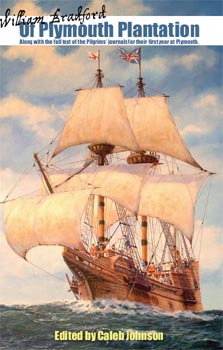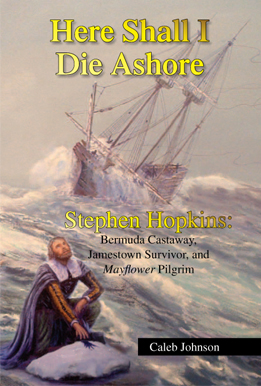Crime and Punishment in Plymouth Colony
Warning to Parents and Teachers:
Some of the criminal acts discussed on this page are very graphic and explicit in nature, and some involve sexual acts that are shocking and repulsive even by non-Puritanical standards.
Records from Plymouth Colony's earliest courts have actually survived almost entirely intact. Just prior to the outbreak of the American Civil War, they were published in a 12-volume set edited by Nathaniel B. Shurtleff and David Pulsifer, and they have been reprinted on several occasions since. Some of the court records date back as early as 1623, and continue through 1691, when Plymouth Colony merged with the Massachusetts Bay.
The Plymouth Colony's court records are very interesting, as they provide a glimpse into the everyday life of the Pilgrims (albeit usually the negative side). They provide insight into how the Pilgrims interpreted scriptural and English law, and a look at their moral and religious values.
In 1636, the Plymouth Colony formally codified its five crimes that were punishable by death:
willful murder
forming a solemn compact with the devil by way of witchcraft
willful burning of ships or houses
sodomy, rape, and buggery
adultery
Plymouth Colony never attempted to put anyone to death for adultery, although Mayflower passenger William Latham's wife Mary was hanged for adultery in the neighboring Massachusetts Bay Colony in 1644. In Plymouth Colony in 1639, Mrs. Mary Mendame of Duxbury was convicted of "uncleanness" with an Indian named Tinsin, and was sentenced to be whipped at a cart's-tail through the town streets and to wear an AD badge: which, if she was found without, would be branded onto her forehead. In 1641, an adulterous affair between singleman Thomas Bray and Mrs. Anne Linceford was discovered, and both parties were sentenced to public whipping at the post, and to wear the AD badge on their clothing. In 1658 the law was finally rewritten to formalize how it had been administered previously: it defined the punishment for adultery as two severe whippings, once right after conviction and once at a second time to be determined by the magistrates; and the individual would have to wear the letters AD "cut out in cloth and sowed on their uppermost garment on their arm or back." If at any time they were found without the mark within the jurisdiction of the Colony, they would be publicly whipped. In 1662, Thomas Bird was sentenced to double whippings for committing "several adulterous practices and attempts, so far as strength of nature would permit" with Hannah Bumpass, who was also sentenced to be whipped once "for yielding to him, and not making such resistance against him as she ought." Bird was also sentenced to pay Hannah £10 for "satisfaction for the wrong he hath done her."
The first person executed for murder was Mayflower passenger John Billington, who was hanged in September 1630. He had gunned down John Newcomen, apparently the result of an ongoing quarrel. Arthur Peach, Thomas Jackson, Richard Stinnings and Daniel Cross were convicted of murdering an Indian named Penowanyanquis in 1638: the motive was robbery. Daniel Cross escaped custody, but the others were executed by hanging. The triple-hanging sent a strong message that Plymouth Colony would treat the murder of Native Americans equally. In 1648, Alice Bishop was hanged for slashing the neck of her 4-year old daughter Martha with a knife, while Martha was sleeping in her bed: perhaps the most shocking and horrific crime in Plymouth Colony's history.
Nobody in Plymouth Colony was ever charged with intentionally burning a house or ship, so arson as a capital crime was never tested in Plymouth court.
There were two witchcraft trials in Plymouth Colony, decades before the more famous Salem Witchcraft trials of 1692. Both Plymouth Colony witchcraft trials ended in not guilty verdicts: in fact the accusers were fined by the court for having made false accusations.
In 1637, John Alexander and Thomas Roberts were changed with and convicted of "lude behavior and unclean carriage one with another, by often spending their seed one upon another, which was proved both by witness and their own confession; the said Alexander found to have been formerly notoriously guilty that way, and seeking to allure others thereunto." John Alexander was sentenced to a severe whipping, then to be burned in the shoulder with a hot iron, and then to be permanently banished from the Colony. Roberts was sentenced to a severe whipping, but was not banished. He was prohibited from ever owning any land within the Plymouth Colony "except he manifest better desert."
In 1642, a 16-year old boy, Thomas Granger, a servant to Mayflower passenger Love Brewster, was caught (and later admitted to) bestial acts with various of Brewster's livestock, and was executed (along with the animals) per Biblical precedent (Leviticus 20:15).
In 1660, Thomas Atkins was tried for incest with his daughter Mary. The jury found him not guilty of the capital crime of incest, but sentenced him to a whipping for "incestuous attempts" towards his daughter "in the chimney corner," while intoxicated with drink.
Plymouth Colony enacted a number of fines and punishments for lesser, misdemeanor crimes. The following table illustrates some of the crimes, and their associated fine or punishment.
From a modern perspective, Plymouth Colony had some unique laws. Gun control was not much of an issue back then: in fact, if you were a member of the militia, there was a twelve pence fine for failing to bring your loaded gun to church with you. Today we have a problem with low voter turnout: Plymouth Colony solved this by imposing a fine on all freeman who failed to vote.
If you thought anti-smoking laws were a thing of the modern era, think again. In 1637, Plymouth Colony enacted the first anti-smoking law: a 12 pence fine for smoking in any street, barn, outhouse or highway, and for smoking anywhere further than 1 mile from your house. The fine increased to 2 shillings for a second offense. In 1640, a 5 shilling fine was enacted for any juror who smoked at any time during a trial, prior to giving a verdict. In 1669, smoking to and from church was added as a 12 pence fine.
Plymouth also enacted wildlife conservation laws, ... well, at least it was illegal to catch fish before they had spawned.
All criminal cases in Plymouth Colony, and civil cases involving trespassing or debts, were to be tried by a jury of twelve men, whose names went onto the public record. A grand jury system was also implemented. The court itself met four times a year, plus special circumstances; and was adjudicated by the governor and his five to seven assistants, all of whom were elected by the Colony's freemen to 1-year terms.




